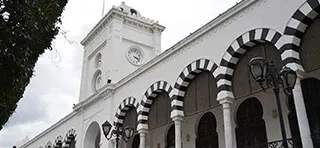Tunisia: Completion of the Roman Amphitheater Preservation Project in El Jem with $430,313 in U.S. Support

U.S. Ambassador Joey Hood, accompanied by the Director General of the National Heritage Institute, Mr. Tarek Al-Bakoush, attended a ceremony marking the completion of the preservation project for the Roman Amphitheater in El Jem. The U.S. government funded this five-year project with over 1.3 million Tunisian dinars ($430,313) through the Ambassadors Fund for Cultural Preservation (AFCP).

The project included restoring and securing the amphitheater’s structures, improving its drainage and electrical systems, and enhancing accessibility for persons with disabilities. The Roman Amphitheater in El Jem is one of Tunisia’s most prominent archaeological landmarks and provides significant economic opportunities as a major tourist destination.

The project included restoring and securing the amphitheater’s structures, improving its drainage and electrical systems, and enhancing accessibility for persons with disabilities. The Roman Amphitheater in El Jem is one of Tunisia’s most prominent archaeological landmarks and provides significant economic opportunities as a major tourist destination.
During the ceremony, Ambassador Hood praised the efforts of the National Heritage Institute team, expressing appreciation for their dedication to the project’s success despite challenges, including the COVID-19 pandemic. He stated, “Thanks to the support and collaboration of our friends and partners at the National Heritage Institute, we achieved our goals.”
The Ambassador also announced the opening of a call for proposals for new projects to qualify for the AFCP grant program for 2025. This program supports the preservation of historic buildings, archaeological sites, manuscripts, and forms of traditional cultural expression such as handicrafts and indigenous languages across more than 120 countries worldwide.
This initiative presents a valuable opportunity for NGOs, local and international institutions to enhance their efforts in preserving cultural heritage.























 Om Kalthoum - ط£ط±ظˆط ظ„ظ…ظٹظ†
Om Kalthoum - ط£ط±ظˆط ظ„ظ…ظٹظ†
Comments
0 de 0 commentaires pour l'article 299075